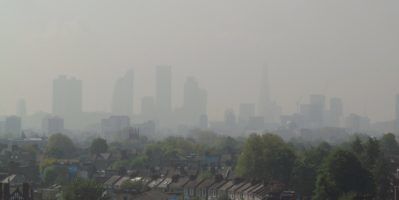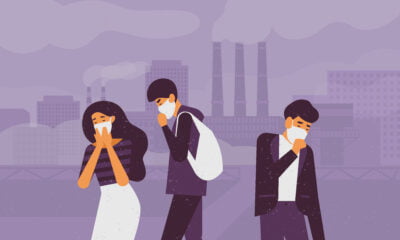

Energy
7 Ways Air Pollution Damages Your Health
Sources of air pollution include traffic, commercial buildings, manufacturers, and even residential areas. But it’s particularly rampant in large cities where there are millions of people creating smog that spreads into and across the atmosphere.
Whether you believe in climate change or not, air pollution alone clearly causes some negative health effects. Knowing the risks may broaden the spectrum of citizens who are willing to participate in fighting it.
This is vital, since many consumers don’t regard air pollution as their problem. They see it rather as a big business issue, and therefore they feel no duty to help.
If you’re at all inclined to dismiss air pollution as someone else’s problem, consider some of the negative health effects you should know about.
1. Lack of Exercise
Exercise is essential to your health, for both weight loss reasons and long-term health benefits. When air pollution becomes too heavy, though, regular outdoor exercise becomes overly challenging.
The air is thick and difficult to breathe, and people are less willing to spend time outside. Not everyone can afford a gym membership, so this is how air pollution contributes to the epidemic of obesity.
2. Respiratory Illnesses
Respiratory ailments such as asthma get aggravated by high carbon dioxide content in the air. Although air pollution has mostly improved across the nation since the 1990s, citizens who have respiratory illnesses are still counseled to move to a rural area where there’s less pollution, because pollutants irritate the condition.
3. Reduced Immunity
A direct result of air pollution, particularly for children with respiratory conditions, is the suppression of the immune system. In a study of 181 children with asthma in Fresno and Palo Alto, California, it was revealed that the particulates in the polluted air suppressed the T cells that regulate the child’s immune system.
As a result, it was more difficult for their bodies to manage illness. Also, it was found that pregnant mothers exposed to air pollution were more likely to give birth to children with a compromised immune system.
4. Increased Cancer Risk
The particulates in air pollution primarily consist of carcinogens. As you probably know, carcinogens are substances that encourage the development of cancer cells.
Though the majority of these carcinogens are benign, they can lead to an increased risk of cancer. Research has shown that lung cancer is a particularly hazardous risk because of the respiratory effects of air contamination.
5. Challenges to the Reproductive System
Though air effluents and reproductive health are not often linked, some cases of infertility have been directly attributed to prolonged exposure to smog. There have also been links to birth defects. If you are having any issues with getting pregnant, it is better to use the services of specialists at Fertility Plus.
This research came out in the 1990s, before major measures to curtail air pollution had taken effect. Though birth defects are still found in urban areas today, they’re not as common as they once were. This is a strong indication, however, that as air pollution becomes worse, more birth defects are likely to result.
6. Potentially Poisoned Food Chain
Plants are directly connected to the air. When the air is diseased, it will damage the plants. When animals eat those plants, their flesh will become contaminate contaminated.
When humans eat the plants or the meat, the contents can make them sick. It’s a vicious though complicated cycle, and it can pose long-term effects for the human race.
7. Contaminated Water
Water can also be contaminated by pesticides, carbon dioxide, and other pollutants that build up in the air. Aside from poisoning the food chain, this process can directly poison human water supplies, and make people sick.
Air pollution is definitely not a problem of and for big businesses alone. It’s something that individuals must fight as well if we want to live a happier, healthier lifestyle … and have one to pass on to our children.


 Features10 months ago
Features10 months agoWhat is the Eco-Friendliest Option to Wash Your Dishes?

 Environment12 months ago
Environment12 months agoBuilding a Career in Green Construction: Tips and Insights

 News11 months ago
News11 months ago5 Ways Fleet Maintenance Software Can Help Businesses Be More Eco-Friendly

 Features10 months ago
Features10 months agoAddressing Pressing Ethical Concerns with Crypto Exchanges





























